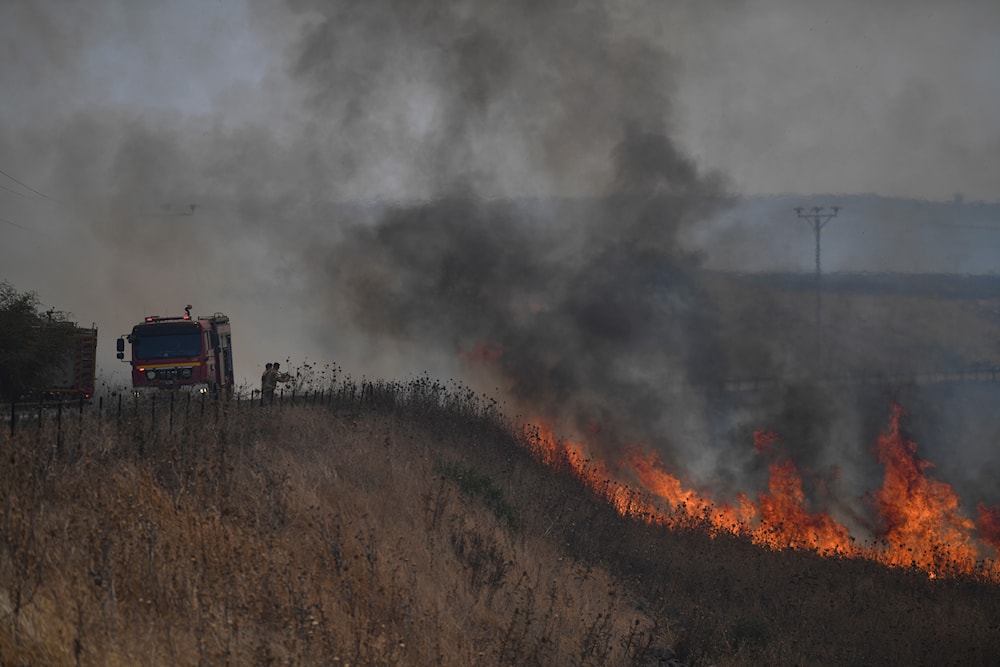'Israel' worried about Hamas future, unbearable Lebanon war: FT
The Financial Times covers the fears within the Israeli occupation about the future of Hamas and the prospective war with Lebanon in light of Hezbollah's unbearable firepower.
-

Israeli firefighters work to extinguish a fire following an attack from the Islamic Resistance in Lebanon - Hezbollah, in an area in the occupied Golan Heights, July 4, 2024. (AP)
A recent interview on the Financial Times' Rachman Review with former MI6 chief John Sawers highlights growing concerns among Israelis about the future strength of Hamas and the potential for a devastating conflict with Lebanon.
According to Sawers, Israeli sources indicate that 60% of current Hamas fighters are children of fighters martyred in previous confrontations with the Israeli occupation and operations against it. This suggests that many of those who lost family members during the ongoing war on Gaza are likely to join the ranks of Hamas in the future.
The interviewee pointed out that Israelis are particularly worried about the situation in the North, along the occupied Palestinian border area with Lebanon, where Israeli forces have suffered significant damage at the hands of the Lebanese Resistance.
"They've had several hundred people killed, but far worse in many ways, they've had several thousand with life-changing injuries," he said, underlining that this took its psychological toll on the Israeli occupation forces, deeply affecting their morale and giving them the feeling that they are "quite stretched" in the meantime due to the ongoing confrontations in the South and North.
Speaking of an escalation with Lebanon, the British former official raised doubts about the Israeli occupation's military endurance were that to happen. "The Americans certainly don't want it. And it's not clear the Israelis can really afford it militarily."
He also suggested that the Israeli occupation forces, due to being spread too thin between Lebanon and Gaza, might not be able to limit the amount of damage that would be dealt to the occupation from Lebanon. "There'll be more casualties on the [IOF] side."
The Economist reported on Tuesday, citing an Israeli officer, that Hezbollah was much better prepared for an Israeli ground invasion of Lebanon compared to Ukraine's previous preparations against Russia in 2022.
The officer pointed out that the locations that the Israeli military believed to be "well camouflaged" were repeatedly discovered and struck by Hezbollah, adding that the only reason the Israeli army has not suffered huge casualties in the North is that its forces "remain out of sight."
Tamir Hayman, former Israeli military intelligence chief, considered that if "Israel" wants to "create a change," it must "destroy all of Hezbollah's system."
"And right now I think it cannot be achieved," he indicated.
A former senior Mossad official stressed that the Israeli military is fatigued from Gaza operations and requires at least six months to prepare for another war.
According to the report, there have been four major changes since the July 2006 war on Lebanon, with the first being that the Lebanese Resistance group has acquired a wide range of "Iranian-designed kamikaze drones."
It noted that, despite many of the Israeli tanks and armored vehicles being equipped with active protection systems that can counter anti-tank missiles, these drones "target weaker points on the top of vehicles."
The second change is that Hezbollah has developed its ground forces, with its elite Radwan force, "intended to strike as far as 20km into Israel." Third comes the combat experience that Hezbollah fighters gained fighting alongside Russian air forces in Syria.

 4 Min Read
4 Min Read








